This year, extreme weather events — from record-breaking heat waves and droughts to hurricanes and floods — have hammered nearly every corner of the globe, making the catastrophic impacts of climate change all too tangible. Meanwhile, Russia’s invasion of Ukraine has caused a global food price crisis, fueling an already-present global hunger emergency and revealing the vulnerability of the globalized system of industrialized agriculture to shocks from climate change or war.
Within this context of converging climate and food system crises, global leaders and members of civil society will convene in November in Sharm el-Sheikh, Egypt at the 27th United Nations Framework Convention on Climate Change (UNFCCC) Conference of the Parties (COP). Decades of poor policy choices and lack of climate action have shoehorned us into a moment of polycrises, but with each climate conference, governments are offered a new opportunity to evaluate the impacts of our changing climate and identify avenues of global cooperation, whether that be increasing national commitments to reduce emissions or pledging to slash methane, or setting structures and priorities for climate adaptation finance for countries facing the most severe effects of the climate crisis. At COP 27, there’s an opportunity to set forth a framework to guide rules, regulations and investments to create a food and agriculture system that protects people and the planet. Read about IATP's priorities for COP 27 here.

Uprooted: Talking COP27
Throughout IATP's four-part podcast series, hear from IATP policy experts on the nexus of agriculture and climate change in the context of the UNFCCC climate conventions, what our experts expect to see happen at COP27 and what must be done to create more resilient food and farm systems in the face of climate change.

IATP's Sharm el-Sheikh Series | COP 27
IATP Reports
IATP Articles

COP27 Events


Watch Recordings of Past Events
Decades of poor policy choices and lack of climate action have shoehorned us into a moment of polycrises, but with each climate conference, governments are offered a new opportunity to evaluate the impacts of our changing climate and identify avenues of global cooperation.
Photo Credit for banner image: United Nations Framework Convention on Climate Change (UNFCC) via Flickr.













